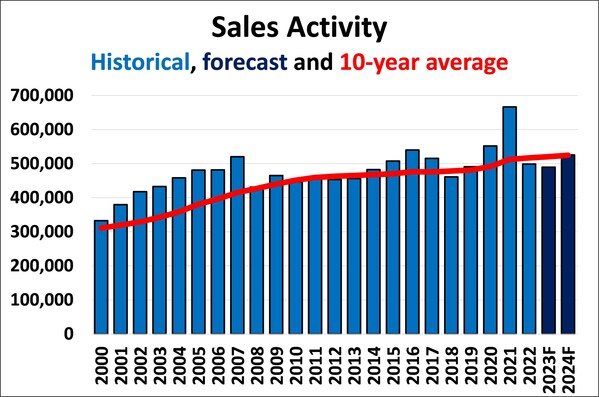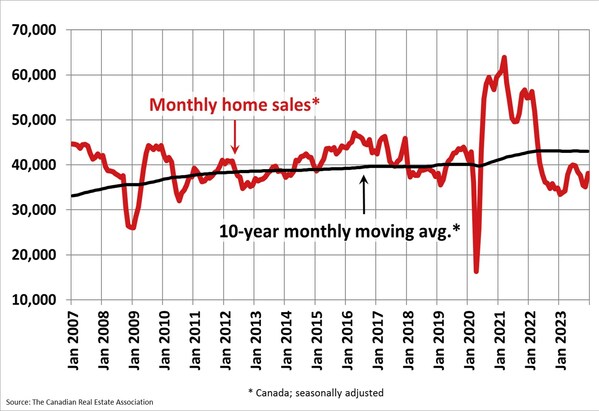Home sales activity recorded over Canadian MLS Systems rose 8.7% between November and December 2023, putting it on par with some of last year’s relatively stronger months recorded over the spring and summer. The actual (not seasonally adjusted) number of transactions came in 3.7% above December 2022, the largest year-over-year gain since August, according to a report released Monday by the Canadian Real Estate Association.
On an annual basis, home sales totalled 443,511 units in 2023, a decline of 11.1% from 2022. It was technically the lowest annual level for national sales activity since 2008; although it was very close to levels recorded in each of the five years following the 2008 financial crisis, as well as the first year the uninsured stress test was implemented in 2018, said CREA.
“While December did offer up a bit of a surprise in sales numbers to cap the year, the real test of the markets’ resilience will be in the spring,” said Larry Cerqua, Chair of CREA. “There are only a couple of months left until that gets underway.”
“Was the December bounce in home sales the start of the expected recovery in Canadian housing markets? Probably not just yet,” said Shaun Cathcart, CREA’s Senior Economist. “It was more likely just some of the sellers and buyers that were holding onto unrealistic pricing expectations last fall finally coming together to get deals done before the end of the year. We’re still forecasting a recovery in housing demand in 2024, but we’ll have to wait a few more months to get a sense of what that ultimately looks like.”
CREA said the number of newly listed homes dropped by 5.1% on a month-over-month basis in December, bringing them to the lowest level since June. With sales up and new listings down in December, the national sales-to-new listings ratio tightened to 57.8% compared to just 50.5% in November. The long-term average for the national sales-to-new listings ratio is 55%. There were 3.8 months of inventory on a national basis at the end of December 2023, down notably from 4.2 months at the end of November. The long-term average is five months of inventory.
The report said the Aggregate Composite MLS Home Price Index (HPI) declined by 0.8% on a month-over-month basis in December 2023. In line with firming market conditions, this measure was smaller than the 1% decrease recorded in November and the 0.9% decline logged in October.
“Price declines of late have been predominantly located in Ontario markets, particularly the Greater Golden Horseshoe, and to a lesser extent British Columbia. Elsewhere in Canada prices are mostly holding firm or in some cases (Alberta, New Brunswick, and Newfoundland and Labrador) continuing to climb. That said, as market conditions have recently been evolving, price trends are becoming more of a mixed bag where the regional differences are less clearly defined,” it said. “The Aggregate Composite MLS HPI was up 0.7% on a year-over-year basis in December 2023, up slightly from the 0.6% year-over-year gain in November. The actual (not seasonally adjusted) national average home price was $657,145 in December 2023, up 5.1% from December 2022.”

RDNE Stock project
In another report released Monday, CREA updated its forecast for home sales activity and average home prices for 2024 and has extended the outlook to include 2025.
Canadian housing markets have remained quiet since the Bank of Canada’s interest rate hikes last summer. Interest rates have been the major factor affecting markets over the last few years, and this is expected to continue in 2024 and 2025, said CREA.
“Expectations around the timing of the first 2024 rate cut have recently been pulled forward. The expected number of total cuts to interests rates (in terms of basis points) in 2024 have also increased in the last few months. Combined with ever-increasing pent-up demand for housing in Canada, the forecast for housing sales activity this year has been raised. That being said, given its starting point is lower than previously expected, the 2024 annual forecast remains relatively unchanged,” it said.
“Some 489,661 residential properties are forecast to trade hands via Canadian MLS Systems in 2024, a 10.4% increase from 2023. The bigger sales gains in 2024 are expected to come from provinces where housing demand is strong (Alberta in particular), along with provinces that are expected to see a rebound from historically low sales volumes (British Columbia, Ontario, Nova Scotia).”

The report said the national average home price is forecast to climb 2.3% on an annual basis to $694,173 in 2024. Alberta, Quebec, New Brunswick, Nova Scotia and Newfoundland and Labrador are all forecast to see price gains in excess of the national increase. British Columbia and Ontario are forecast to see prices largely remain flat.
“National home sales are forecast climb another 7.3% to 525,498 units in 2025 as interest rates continue to decline and approach more normal or “neutral” levels. This forecast would still have activity running below it’s long-term trend,” it said.
“The national average home price is forecast to rise by 4% from 2024 to $722,063 in 2025, as demand continues to strengthen amid ongoing supply constraints. Prices in Alberta and on the East coast are again expected to outperform other parts of Canada in 2025.”
Looking ahead to 2024, it’s notable that even CREA seemed a bit cautious on the outlook, even with this weather-aided rebound in December sales, said Doug Porter, Chief Economist with BMO Economics.
“One big plus for the market is the recent plunge in bond yields, which has carved the all-important five-year GoC by more than 110 basis points from the peak just three short months ago. This rapid descent has translated into falling long-term mortgage rates, no doubt reviving sentiment. In addition, fiery population growth, still-decent employment gains, and rapidly rising rents are keeping important support squarely under demand. Our official call is for sales to be roughly flat in volume terms this year, and for the HPI to dip another 4% on average (after a 5.9% drop in 2023), but the sudden drop in long-term rates suggests the risks to those calls are to the high side. A potential stirring in the housing market may be one of the key reasons the Bank of Canada is doggedly sticking with a hawkish narrative, concerned that a quick turn in housing could inflame smoldering inflation pressures,” he said.
Rishi Sondhi, Economist with TD Economics, said December’s impressive sales performance, drawing support from falling bond yields, suggests better-than-expected momentum heading into 2024.
“However, we’d be cautious in drawing too many implications from this report, as December is typically a low volume sales month, and very favourable weather conditions across the country may have pulled forward purchases. As such, we’d need a few more months of data to assess if this is really a turning of the tides for housing,” he said.
“Much of December’s upside surprise in sales and prices took place in Ontario, where the market tightened considerably. Indeed, Ontario’s sales-to-new listings ratio climbed to 54% from 41%. This huge monthly move was the largest on record. The last few times swings in Ontario’s ratio even approached this magnitude, they were quickly unwound (either partially or fully), so again, caution is warranted in interpreting this development.
“The increase in average prices in December does suggest some degree of upside risk to our 2024Q1 forecast. That said, we’re not yet ready to abandon our call that Canadian average home prices will decline in the first quarter, amid looser-than-normal supply/demand balances in B.C. and Ontario. Indeed, benchmark prices (which are typically thought of as giving a better indication of the underlying trend in prices) declined last month.”

Mario Toneguzzi
Mario Toneguzzi is Managing Editor of Canada’s Podcast. He has more than 40 years of experience as a daily newspaper writer, columnist, and editor. He was named in 2021 as one of the Top 10 Business Journalists in the World by PR News – the only Canadian to make the list
About Us
Canada’s Podcast is the number one podcast in Canada for entrepreneurs and business owners. Established in 2016, the podcast network has interviewed over 600 Canadian entrepreneurs from coast-to-coast.
With hosts in each province, entrepreneurs have a local and national format to tell their stories, talk about their journey and provide inspiration for anyone starting their entrepreneurial journey and well- established founders.
The commitment to a grass roots approach has built a loyal audience on all our social channels and YouTube – 500,000+ lifetime YouTube views, 200,000 + audio downloads, 35,000 + average monthly social impressions, 10,000 + engaged social followers and 35,000 newsletter subscribers. Canada’s Podcast is proud to provide a local, national and international presence for Canadian entrepreneurs to build their brand and tell their story.






